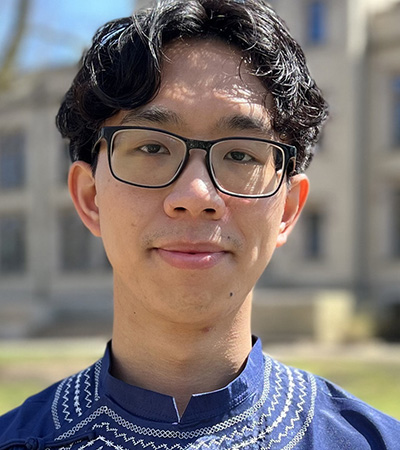Honors for Chandel, Svaren and Khal
Chandel wins Lurie Prize
Navdeep Chandel was one of two recipients of the 2023 Lurie Prize in Biomedical Sciences, the Foundation for the National Institutes of Health announced. This award is given to researchers under the age of 52 who have made important and distinct discoveries in the field of mitochondrial science by exploring the characteristics and functions of mitochondria in human physiology and disease.

Chandel is a professor of medicine, biochemistry and molecular genetics at Northwestern University Feinberg School of Medicine. His lab studies mitochondria as signaling organelles in the context of cellular differentiation, cancer and immunity. In 2015, he published an introductory book titled “Navigating Metabolism.”
In addition, Chandel has published hundreds of research articles and is highly cited, according to Clarivate. He received the National Cancer Institute Outstanding Investigator Award in 2016. He has also won the Clarence Ver Steeg Faculty Mentor Award, which recognizes faculty at Northwestern for supporting and encouraging the academic and professional development of graduate students.
Chandel and the other Lurie Prize recipient, Vamsi K. Mootha, each received a $50,000 honorarium, and both were recognized at the FNIH 11th Annual Awards Ceremony in October in Washington, D.C.
Svaren appointed to research leadership
John Svaren became the interim associate vice chancellor for research in the biological sciences at the University of Wisconsin in September. In this new role, he oversees the biological sciences and interdisciplinary research across campus. In addition, Svaren is responsible for divisional area recruitment and retention, grant matches, faculty awards and special initiative awards such as Research Forward.

Svaren is a professor of comparative biosciences at the UW School of Veterinary Medicine and director of the Waisman Center intellectual and developmental disabilities core. His research explores the genomic and epigenetic determinants of the myelination process. In addition, Svaren is developing new therapeutics to treat myelination disorders such as the inherited peripheral neuropathy known as Charcot-Marie-Tooth disease. His lab was the first to develop chromatin immunoprecipitation analysis to identify regulatory elements in peripheral myelin genes.
Svaren has received a UW Vilas Associate Research Award and been honored as an outstanding mentor in the Ronald E. McNair Post-Baccalaureate Achievement Program. He also received a Pfizer Research Award from the UW School of Veterinary Medicine.
“I am looking forward to this new leadership opportunity to interact with and support researchers in the biological sciences across campus,” Svaren said in a UW press release. “The interdisciplinary research enterprise at UW–Madison has been a tremendous asset and I hope to help foster continued growth so that our research mission remains on the cutting edge.”
Khal wins Duke chancellor’s award
The Duke University School of Medicine Office of Biomedical Graduate Education announced that nine second-year Ph.D. students received the 2023 Chancellor’s International Award. Among the awardees is American Society for Biochemistry and Molecular Biology member Sai Kwan Khal. The chancellor’s awards supports international students with a full year of tuition and fees as well as a stipend to help cover living expenses. The award also provides recipients with opportunities for professional development, such as workshops, conferences and mentorship programs.

Khal is a graduate student in biochemistry and works in the lab of Michael Boyce, an associate professor of biochemistry at Duke. Khal’s research focuses on protein glycosylation during health and disease. He completed his undergraduate degree at the College of Wooster in Ohio. During his time at Wooster, Khal served as a peer educator, teaching his fellow students about health issues such as alcohol use and stress management.
“International students bring a wealth of knowledge and experience to research universities,” Beth Sullivan, the associate dean for research training and professor of molecular genetics and microbiology, said in a Duke press release. “Their diverse perspectives foster critical and creative thinking. This diversity of perspectives is essential for conducting cutting-edge research.”
Enjoy reading ASBMB Today?
Become a member to receive the print edition four times a year and the digital edition monthly.
Learn moreGet the latest from ASBMB Today
Enter your email address, and we’ll send you a weekly email with recent articles, interviews and more.
Latest in People
People highlights or most popular articles

The timekeepers of proteostasis
Learn about the cover of the winter 2026 ASBMB Today issue, illustrated by ASBMB member Megan Mitchem.

Defining JNKs: Targets for drug discovery
Roger Davis will receive the Bert and Natalie Vallee Award in Biomedical Science at the ASBMB Annual Meeting, March 7–10, just outside of Washington, D.C.

Building better tools to decipher the lipidome
Chemical engineer–turned–biophysicist Matthew Mitsche uses curiosity, coding and creativity to tackle lipid biology, uncovering PNPLA3’s role in fatty liver disease and advancing mass spectrometry tools for studying complex lipid systems.

Summer research spotlight
The 2025 Undergraduate Research Award recipients share results and insights from their lab experiences.

Pappu wins Provost Research Excellence Award
He was recognized by Washington University for his exemplary research on intrinsically disordered proteins.

In memoriam: Rodney E. Harrington
He helped clarify how chromatin’s physical properties and DNA structure shift during interactions with proteins that control gene expression and was an ASBMB member for 43 years.
